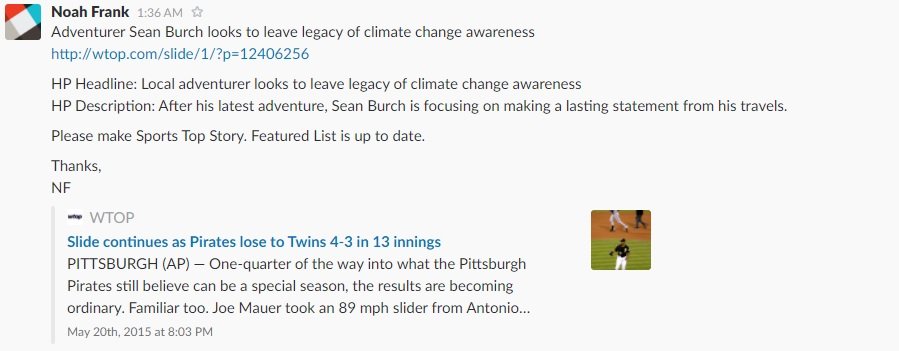WASHINGTON — I don’t remember when I first noticed it, but I distinctly recall the mix of panic and fear that slowly devolved into confusion, which spiraled into an odyssey that enveloped the entire WTOP web team.
Everyone who works in an office deals with failing, outdated or unexplainable technology quirks — the printer that keeps jamming; the Adobe Flash Player that keeps crashing; Windows Vista.
Like many of you, we here at WTOP use the web messaging service Slack for intra-office communication. We have different channels to connect our various teams, over which we share photos, videos, audio files and website links. In all, it’s a clean, straightforward and fairly effective way of putting valuable information into a communal space.
There’s just one quirk.
For some reason, when the web team shares links to our unpublished stories for editing purposes, Slack recognizes them all as the same story: a May 20, 2015, article about a 13-inning, 4-3 win by the Minnesota Twins over the Pittsburgh Pirates.
Late one night, when filing a story to the rest of our web team through Slack, I looked up to see the message I had just sent, and noticed the preview link showed the image above. Had I somehow grabbed the wrong link? Why would I have copied that one? The game wasn’t even from our market, or from the current baseball season.
What was this madness?
I tried again and got the same result. I figured it was a one-time oddity. Until it happened again. And again. Then I found out it wasn’t just happening to me.
It wasn’t actually every story, though. The problem would pop up intermittently, but consistently. This was not just limited to sports stories, either.
“Why you’ll find Alaskan fish at the local farmer’s market”? Slide continues as Pirates lose…
“Kennedy Center Spring Gala salutes John Lennon”? Slide continues as Pirates lose…
To fans of Douglas Adams’ writing or films like “Being John Malkovich,” this absurdist setup may feel familiar, but I assure you this is not fiction.
Slowly, over time, a simple technological glitch ballooned into a full-blown existential crisis, the type created by the rapid progression of our technology coupled with our diminished capability to understand it all.
Nobody in the office can seem to remember exactly when it started, but general consensus is that it’s been going on for anywhere from four months to at least a year.
At first, after discovering that it was essentially harmless, it was funny. Just an inside joke among coworkers, who would roll their eyes every time a summer movie guide or list of recipes displayed instead as a random baseball game.
But pretty soon, I couldn’t escape it. I wanted to know more about the Pirates’ slide, one which they halted immediately after an off day following this heartbreaking defeat, reeling off consecutive sweeps of both the eventual National League Champion New York Mets as well as the Miami Marlins en route to winning 21 of their next 26 games. After the loss and mini sweep at the hands of the Twins, they sat at just 18-22, but would go on to win 98 games and secure a Wild Card spot for the second straight season.
The slide itself only continued through that final pitch of this game, the one Slack was somehow magically selecting time and again.
What was it telling me? What did it all mean? I dove deeper into the box score.
The game itself was pretty exciting, as far as a regular season game between a pair of interleague non-rivals goes. The Pirates fell in an early 3-0 hole, but scratched back and eventually tied it on Andrew McCutchen’s solo shot to right-center in the bottom of the eighth, sending the game to extra innings. With one out in the top of the 13th, Joe Mauer homered off Antonio Bastardo to push the Twins in front. And, despite a one-out single by McCutchen and a two-out walk from Jung Ho Kang to put the winning run on base, Glen Perkins struck out Pedro Alvarez to lock down the 15th of his 32 saves that year.
This was all fine and good, but didn’t offer me any concrete clues. I dropped a line to a former colleague who uses Slack in his current workplace to see if he had encountered any similar issues. He said he hadn’t. Could it be something else, some other part of the process creating this quirk?
I asked our site editor. She suggested that it probably wasn’t Slack at all, but likely some internal issue with our WordPress-based system. So I started seeking out WordPress experts.
I reached out to a prominent WordPress programmer with my query, and he got back to me quickly. But after a couple correspondences, the trail went cold and my question went unanswered.
I turned to our web developer, who reached out in online forums, screaming into the digital void, looking for answers. I would check back every week or two. Nothing.
My slide into madness and despair continued with each thumbnail of the out-of-focus Bastardo awaiting a new baseball as Mauer rounded the bases behind him.
Sometimes we grasp onto world events, sporting events — things happening outside our own spheres of influence — to try to help put our lives into perspective. It feels comforting, reassuring, to connect yourself to the idea of some shared sense of humanity.
Maybe there was some lesson to be learned from this story Slack kept insisting upon us. Maybe it was that, even as a streak of bad luck stretches seemingly endlessly into the dark, there is a hope in knowing it’s only a matter of time until it turns around. Maybe the particulars of such a mystery are meant to be left as such, an unknowable conundrum in a modern world obsessed with knowing and sorting every last detail. Maybe the…
“I think I figured it out.”
What?
It’s our web developer. He explains that when we put our draft links in Slack, part of the URL drops, so the system tries to guess what story it is by looking for keywords. Our photo galleries all include the word “slide” in the URL, so the system looks for the easiest and best match to that keyword…in this case, “Slide continues….”
Oh.
And just like that, the slide was over. Now, if we could just do something about that stupid Flash Player…






